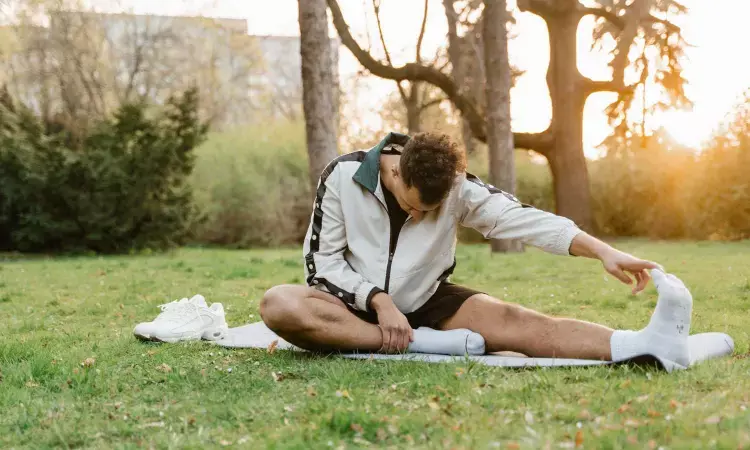- Home
- Medical news & Guidelines
- Anesthesiology
- Cardiology and CTVS
- Critical Care
- Dentistry
- Dermatology
- Diabetes and Endocrinology
- ENT
- Gastroenterology
- Medicine
- Nephrology
- Neurology
- Obstretics-Gynaecology
- Oncology
- Ophthalmology
- Orthopaedics
- Pediatrics-Neonatology
- Psychiatry
- Pulmonology
- Radiology
- Surgery
- Urology
- Laboratory Medicine
- Diet
- Nursing
- Paramedical
- Physiotherapy
- Health news
- Fact Check
- Bone Health Fact Check
- Brain Health Fact Check
- Cancer Related Fact Check
- Child Care Fact Check
- Dental and oral health fact check
- Diabetes and metabolic health fact check
- Diet and Nutrition Fact Check
- Eye and ENT Care Fact Check
- Fitness fact check
- Gut health fact check
- Heart health fact check
- Kidney health fact check
- Medical education fact check
- Men's health fact check
- Respiratory fact check
- Skin and hair care fact check
- Vaccine and Immunization fact check
- Women's health fact check
- AYUSH
- State News
- Andaman and Nicobar Islands
- Andhra Pradesh
- Arunachal Pradesh
- Assam
- Bihar
- Chandigarh
- Chattisgarh
- Dadra and Nagar Haveli
- Daman and Diu
- Delhi
- Goa
- Gujarat
- Haryana
- Himachal Pradesh
- Jammu & Kashmir
- Jharkhand
- Karnataka
- Kerala
- Ladakh
- Lakshadweep
- Madhya Pradesh
- Maharashtra
- Manipur
- Meghalaya
- Mizoram
- Nagaland
- Odisha
- Puducherry
- Punjab
- Rajasthan
- Sikkim
- Tamil Nadu
- Telangana
- Tripura
- Uttar Pradesh
- Uttrakhand
- West Bengal
- Medical Education
- Industry
Afternoon exercise better for improving blood sugar levels in type 2 diabetes patients

Lifestyle interventions, such as a healthy diet and a regular physical activity program are established methods for managing diabetes.
Investigators at Brigham and Women’s Hospital and Joslin Diabetes Center have found in a new study that Afternoon exercise was better for improving blood sugar levels in type 2 diabetes patients.Their findings suggest patients with type 2 diabetes who were physically active in the afternoon had the largest improvements after one year in the trial. The team’s results are published in Diabetes Care.
The randomized controlled trial compared an intensive lifestyle intervention with diabetes support and education in patients diagnosed with type 2 diabetes and overweight or obesity to track the development of cardiovascular disease over time. In the current study, the research team assessed whether physical activity at certain times of day was associated with greater improvement in blood glucose control.
“In this study, we shown that adults with type 2 diabetes had the greatest improvement in glucose control when they were most active in the afternoon,” said co-corresponding author Jingyi Qian, PhD, from the Division of Sleep and Circadian Disorders at the Brigham. “We’ve known that physical activity is beneficial, but what our study adds is a new understanding that timing of activity may be important too.”
Physicians recommend that patients with diabetes participate in regular physical activity as a method to manage their blood glucose levels. Elevated blood glucose levels can put people with type 2 diabetes at risk of heart disease, vision impairment, and kidney disease.
The team analyzed physical activity data from the first and fourth years of the Look AHEAD study, which included data from over 2,400 participants. During the study, participants wore a waist accelerometry recording device to measure physical activity. When the Brigham and Joslin team reviewed the data from year 1, they determined that those who engaged in moderate-to-vigorous physical activity in the afternoon had the greatest reduction in blood glucose levels. Upon comparing the data from year 4, the afternoon group maintained a reduction in blood glucose levels. In addition, the afternoon group also had the highest chance of stopping their glucose-lowering/diabetes medications.
The Brigham and Joslin team note that their investigation has limitations; for example, their study is observational and does not measure confounding factors like sleep and dietary intake.
In future studies, the team may test their findings experimentally to investigate the underlying mechanisms that may explain why time of day of activity may influence blood glucose control. From this, the team may be able to provide specific physical activity recommendations for patients.
“Timing does seem to matter,” said co-corresponding author Roeland Middelbeek, MD, assistant investigator at Joslin Diabetes Center. “Going forward, we may have more data and experimental evidence for patients to give more personalized recommendations.”
Reference:
Jingyi Qian, Qian Xiao, Michael P. Walkup, Mace Coday, Melissa L. Erickson, Jessica Unick, John M. Jakicic, Kun Hu, Frank A.J.L. Scheer, Roeland J.W. Middelbeek, Look AHEAD Research Group; Association of Timing of Moderate-to-Vigorous Physical Activity With Changes in Glycemic Control Over 4 Years in Adults With Type 2 Diabetes From the Look AHEAD Trial. Diabetes Care 2023; dc222413. https://doi.org/10.2337/dc22-2413.
Dr Kamal Kant Kohli-MBBS, DTCD- a chest specialist with more than 30 years of practice and a flair for writing clinical articles, Dr Kamal Kant Kohli joined Medical Dialogues as a Chief Editor of Medical News. Besides writing articles, as an editor, he proofreads and verifies all the medical content published on Medical Dialogues including those coming from journals, studies,medical conferences,guidelines etc. Email: drkohli@medicaldialogues.in. Contact no. 011-43720751


